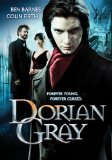| Reviews & Columns |
|
Reviews DVD TV on DVD Blu-ray 4K UHD International DVDs In Theaters Reviews by Studio Video Games Features Collector Series DVDs Easter Egg Database Interviews DVD Talk Radio Feature Articles Columns Anime Talk DVD Savant Horror DVDs The M.O.D. Squad Art House HD Talk Silent DVD
|
DVD Talk Forum |
|
|
| Resources |
|
DVD Price Search Customer Service #'s RCE Info Links |
|
Columns
|
|
|
Dorian Gray (2009)
National Entertainment Media // R // August 24, 2010
List Price: $24.98 [Buy now and save at Amazon]
The Film:
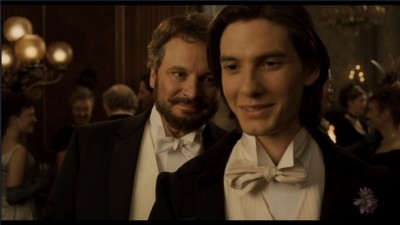 Oscar Wilde's supernatural novel "The Picture of Dorian Gray" focuses on the lightning-in-a-bottle transience of youthful beauty, existing as an ominous and, in ways, "immortal" critique on society's fascination with superficiality and self-indulgence. Over a hundred years later, as we're still vexed by the same obsessive mix of seizing the day and hunting for the figurative Fountain of Youth, it makes sense that an updated take on the Victorian-era gothic horror tale stands a chance at striking a chord with both popular culture and traditional literary circles. Such isn't the case for Oliver Parker's Dorian Gray, unfortunately, which loses the story's message through embellished style, murky themes, and a tawdry pastiche of hedonistic wiles -- not to mention a merely tolerable turn from Ben Barnes as Dorian.
Oscar Wilde's supernatural novel "The Picture of Dorian Gray" focuses on the lightning-in-a-bottle transience of youthful beauty, existing as an ominous and, in ways, "immortal" critique on society's fascination with superficiality and self-indulgence. Over a hundred years later, as we're still vexed by the same obsessive mix of seizing the day and hunting for the figurative Fountain of Youth, it makes sense that an updated take on the Victorian-era gothic horror tale stands a chance at striking a chord with both popular culture and traditional literary circles. Such isn't the case for Oliver Parker's Dorian Gray, unfortunately, which loses the story's message through embellished style, murky themes, and a tawdry pastiche of hedonistic wiles -- not to mention a merely tolerable turn from Ben Barnes as Dorian.
Penned by first-time writer Toby Finlay, this adaptation of Wilde's novel takes healthy artistic license with the narrative, beginning with the first frames of the film that feature Barnes' Dorian splattered with blood and holding a shard of glass. After quickly jumping back a year to when Dorian first arrives in Victorian-era London, the story finds familiar ground by introducing the young, bashful twenty-something to artist Basil (Ben Chaplin, Me and Orson Welles) shortly after moving into the lavish home he's recently inherited. Basil, a painter, becomes awe-struck with young Dorian's beauty, which inspires him to create his finest work -- a full-body portrait. Soon, while tip-toeing within Basil's social circle, Dorian connects with the roguish wit of Lord Henry Wotton (Colin Firth, Bridget Jones' Diary) and, under the influence of Henry's philosophies, quickly transforms into a jaded pleasure-seeker.
Basil's painting eventually becomes a supernatural spotlight, just like Wilde's novel and Albert Lewin's '45 classic film, by linking to Dorian's body and causing him to never age or show the wear and tear of his rambunctious lifestyle, instead transplanting the effects of his unsavory adventures to the painting. Oliver Parker's take on the story, however, forgets to let the audience in on much of anything about the painting's other-worldly properties and its effects on Dorian, neglecting to outline any rhyme or reason -- let alone any rules -- to its presence. This adheres more to the source than the Egyptian influence in Lewin's version, yet it's overtly murky in construction within a film setting. It leaves the audience in an ambiguous darkness, swirling together an oily, undefined plot device that never concretely answers whether Dorian willingly or unwillingly barters for immortality or what happens upon its destruction. That also includes whether Dorian's the type of intrinsic soul who'd feel guilt over his decaying self-portrait, truncating Wilde's thematic design and leaving too much unnecessarily vague.
In place of an intellectual core, Dorian Gray fills the void by boldly slithering around the impish corners of an attractively-shot, nudity-filled Victorian London, all to convince us of Dorian's burgeoning experience as he rapidly -- and unconvincingly -- shifts from doe-eyed innocence to unbridled sexuality. The changeover happens in stark, abrupt fashion, even if it supposedly runs the course of a year, with little in the way of a convincing gray area between the Dorian who's rushing into marriage with local actress Sybil Vane (Rachel Hurd-Wood) to a Dorian who finds himself in the middle of multi-gendered threesomes and opium dens. Ben Barnes doesn't really aid in the transition, either. The Chronicles of Narnia actor might carry the character's hyper-attractive allure in a way that convinces of his ability to unshakably woo both sexes, but his shift veers far from the consequence of mere youthful impressionability.
Oliver Parker still directs the other elements in Dorian Gray with a steady hand, rendering a moody gothic temperament and a slow-festering current of tension around Dorian's condition. He makes opulent use of the era's setting, shooting the musty corners of London through Harry Potter cinematographer Roger Pratt's rich eye for detailed, bleak situations, while capturing Dorian's scantily-clad rendezvous in both invitingly warm and chillingly rigid lights, heightening the visceral texture of the sequences nearly to a point that would substantiate his descent into hedonism. Parker also pulls weighty performances from a nuanced Colin Firth and an unnerved Ben Chaplin as the angel and devil on Dorian's shoulders against this backdrop, allowing the two of them to shape him in this juicy environment of endless decanters of gin and brazen women, while also inspiring another elegant performance from The Prestige's Rebecca Hall later on as Henry's daughter.
Atmosphere, lurid images, and fine craftsmanship behind the supporting characters that shape the young man aren't enough to shove Dorian Gray's real purposes forward, which ultimately cloud Lord Henry's conceited banter and Dorian's simmering narcissism all the way through the story's chaotic final act. The lack of focus and an emphasis on stylish riffs in Parker's vision -- including a few feeble traditional jump-scare tactics that fall flat in their attempts to heighten the "horror" -- make for a muddled sludge through Dorian's more awakened later years, swelling with a dark temper but ultimately wandering into a fog. There is a message lying underneath that can almost be grasped, revolving around the pointlessness of squandering one's life away on pleasures of the flesh just get the most mileage out of their outer beauty. But in this attractive and eerie telling, Dorian Gray lacks the clarity to emphasize its thematic magnitude, leaving only an empty shell of supernatural suspense and false growth within a newly-spawned, immortal egotist.
The DVD:
Video and Audio:
Dorian Gray arrives from E1 Entertainment in a 1.85:1 widescreen-enhanced presentation that preserves the fluctuating levels of brown, gray, and blue shades within the dark Victorian-style setting to exquisite degrees. Many sequences take place in dimly-lit locations where booze flows free amid a comely warmth, which are preserved here in a way that showcases fine contrast usage and a respectable level of depth within this standard-definition image. Several instances of detail, especially against the painting of Dorian, the scales in a yellow python, and in the lush costume design, offer quite a few fine moments of respectable crispness in the image. Exterior shots during the day are intentionally handled with a hollow blue-leaning coloring that never exudes much in warmth, and E1's transfer carries the splashes of colors -- greens from trees in a backdrop, cold skin tones, and the soppy rain -- in a healthy fashion. Dorian Gray looks exquisite here.
The aural design in Dorian Gray isn't as definable as the visual presentation, mostly gravitating around the back-and-forth conversations between Dorian and his collection of confidants, but this Dolby Digital 5.1 track offers plenty of mood to the proceedings. Musical cues scale along the mid-to-low range of the bass channel, as do both Colin Firth and Ben Chaplin's svelte vocal deliveries. A few of the sound effects fall a bit flat, like the crashing of a trunk in water, but other ambient elements like flickering fire and rainfall grace the audio treatment nicely. Everything, however, carries through without distortion and finely balanced for a pleasingly atmospheric sound experience. Only English subtitles are available with this release to match the sole English 5.1 track.
Special Features:
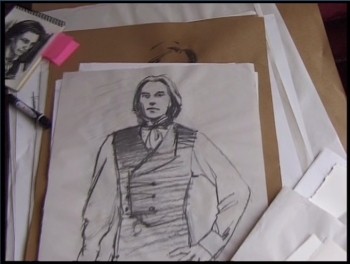 Commentary with Oliver Parker and Toby Finlay:
Commentary with Oliver Parker and Toby Finlay:
As soon as the writer / director duo begin to discuss "stripping out" the assorted ideas from the book in order to focus on something dramatically resonant, things begin to make sense. Oliver Parker explains how it's difficult to capture the story on-screen, how Firth's performance is "mesmeric" in his control (which it certainly can be), how older women walked out of the test screening at the more homoerotic moments in the film, as well as answering some questions about the artistic choices that they concocted for this adaptation. Discussion also focuses on critical reception to the film early in the track, and how the Oscar Wilde Society adored this version of the tale. Their tone drags later on in the audio track as Parker and Finlay lose steam, but the content still remains mildly intriguing as they discuss the film's cyclical nature and some of the striking locational shots.
Featurettes (4x3 SD):
Four short pieces are available that contain raw footage and a few on-the-fly comments, most lasting no longer than three (3) minutes in length. They involves Make-Up and Wardrobe (2:17), The Painting (1:27), and Smithfield Market (2:08). The one exception, Visual Effects (4:14), goes a bit more in-depth with the 3D modeling and subtle effects at-play in the picture, from the shifting visage of the painting to scenery shots implanted in actual footage.
Making of Dorian Gray (19:04, 4x3 SD):
Straight-on interviews with the cast and crew mix with behind-the-scenes shots and snippets from the film in this assembly piece, more concentrating on the cast's feeling about Finlay's interpretation of the source material and their method in latching onto the story's central essence. Writer Finlay expounds on his writing a bit, Rebecca Hall attempts to find the words to describe how the film's both faithful and spruced up for a modern age, and Colin Firth minces words about aesthetic beauty and morality in the work.
Also available are a series of trimming-the-fat Deleted Scenes (5:59, 4x3 SD), a Costume Design Photo Gallery, a Blooper Reel (9:24, 4x3 SD), and a Theatrical Trailer (1:29, 4x3 SD).
Final Thoughts:
Though the gothic genre trappings are full-force in Dorian Gray -- handsomely dim cinematography capturing ornate architecture, a vein of other-worldly suspense, and a hard-edged concentration on narcissism's consuming nature -- Oliver Parker's persistent attempts to convey hedonism's draw through lurid imagery collide with a lack of coherent grasp on the story's core points. What results is an attractive but muddy supernatural mystery that, oddly, mirrors the exact issues that Dorian as a character suffers from: gripping aesthetic beauty and a dark allure, but a contorted inner being. E1 Entertainment's presentation satisfies on a digital and supplemental level, even if the film itself lacks in this reviewer's eyes. Rent It.
Thomas Spurlin, Staff Reviewer -- DVDTalk Reviews | Personal Blog/Site
 Oscar Wilde's supernatural novel "The Picture of Dorian Gray" focuses on the lightning-in-a-bottle transience of youthful beauty, existing as an ominous and, in ways, "immortal" critique on society's fascination with superficiality and self-indulgence. Over a hundred years later, as we're still vexed by the same obsessive mix of seizing the day and hunting for the figurative Fountain of Youth, it makes sense that an updated take on the Victorian-era gothic horror tale stands a chance at striking a chord with both popular culture and traditional literary circles. Such isn't the case for Oliver Parker's Dorian Gray, unfortunately, which loses the story's message through embellished style, murky themes, and a tawdry pastiche of hedonistic wiles -- not to mention a merely tolerable turn from Ben Barnes as Dorian.
Oscar Wilde's supernatural novel "The Picture of Dorian Gray" focuses on the lightning-in-a-bottle transience of youthful beauty, existing as an ominous and, in ways, "immortal" critique on society's fascination with superficiality and self-indulgence. Over a hundred years later, as we're still vexed by the same obsessive mix of seizing the day and hunting for the figurative Fountain of Youth, it makes sense that an updated take on the Victorian-era gothic horror tale stands a chance at striking a chord with both popular culture and traditional literary circles. Such isn't the case for Oliver Parker's Dorian Gray, unfortunately, which loses the story's message through embellished style, murky themes, and a tawdry pastiche of hedonistic wiles -- not to mention a merely tolerable turn from Ben Barnes as Dorian. Penned by first-time writer Toby Finlay, this adaptation of Wilde's novel takes healthy artistic license with the narrative, beginning with the first frames of the film that feature Barnes' Dorian splattered with blood and holding a shard of glass. After quickly jumping back a year to when Dorian first arrives in Victorian-era London, the story finds familiar ground by introducing the young, bashful twenty-something to artist Basil (Ben Chaplin, Me and Orson Welles) shortly after moving into the lavish home he's recently inherited. Basil, a painter, becomes awe-struck with young Dorian's beauty, which inspires him to create his finest work -- a full-body portrait. Soon, while tip-toeing within Basil's social circle, Dorian connects with the roguish wit of Lord Henry Wotton (Colin Firth, Bridget Jones' Diary) and, under the influence of Henry's philosophies, quickly transforms into a jaded pleasure-seeker.
Basil's painting eventually becomes a supernatural spotlight, just like Wilde's novel and Albert Lewin's '45 classic film, by linking to Dorian's body and causing him to never age or show the wear and tear of his rambunctious lifestyle, instead transplanting the effects of his unsavory adventures to the painting. Oliver Parker's take on the story, however, forgets to let the audience in on much of anything about the painting's other-worldly properties and its effects on Dorian, neglecting to outline any rhyme or reason -- let alone any rules -- to its presence. This adheres more to the source than the Egyptian influence in Lewin's version, yet it's overtly murky in construction within a film setting. It leaves the audience in an ambiguous darkness, swirling together an oily, undefined plot device that never concretely answers whether Dorian willingly or unwillingly barters for immortality or what happens upon its destruction. That also includes whether Dorian's the type of intrinsic soul who'd feel guilt over his decaying self-portrait, truncating Wilde's thematic design and leaving too much unnecessarily vague.
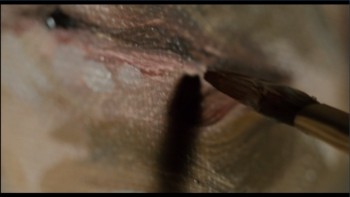 | 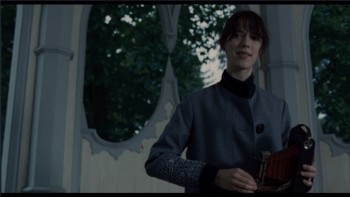 |
In place of an intellectual core, Dorian Gray fills the void by boldly slithering around the impish corners of an attractively-shot, nudity-filled Victorian London, all to convince us of Dorian's burgeoning experience as he rapidly -- and unconvincingly -- shifts from doe-eyed innocence to unbridled sexuality. The changeover happens in stark, abrupt fashion, even if it supposedly runs the course of a year, with little in the way of a convincing gray area between the Dorian who's rushing into marriage with local actress Sybil Vane (Rachel Hurd-Wood) to a Dorian who finds himself in the middle of multi-gendered threesomes and opium dens. Ben Barnes doesn't really aid in the transition, either. The Chronicles of Narnia actor might carry the character's hyper-attractive allure in a way that convinces of his ability to unshakably woo both sexes, but his shift veers far from the consequence of mere youthful impressionability.
Oliver Parker still directs the other elements in Dorian Gray with a steady hand, rendering a moody gothic temperament and a slow-festering current of tension around Dorian's condition. He makes opulent use of the era's setting, shooting the musty corners of London through Harry Potter cinematographer Roger Pratt's rich eye for detailed, bleak situations, while capturing Dorian's scantily-clad rendezvous in both invitingly warm and chillingly rigid lights, heightening the visceral texture of the sequences nearly to a point that would substantiate his descent into hedonism. Parker also pulls weighty performances from a nuanced Colin Firth and an unnerved Ben Chaplin as the angel and devil on Dorian's shoulders against this backdrop, allowing the two of them to shape him in this juicy environment of endless decanters of gin and brazen women, while also inspiring another elegant performance from The Prestige's Rebecca Hall later on as Henry's daughter.
Atmosphere, lurid images, and fine craftsmanship behind the supporting characters that shape the young man aren't enough to shove Dorian Gray's real purposes forward, which ultimately cloud Lord Henry's conceited banter and Dorian's simmering narcissism all the way through the story's chaotic final act. The lack of focus and an emphasis on stylish riffs in Parker's vision -- including a few feeble traditional jump-scare tactics that fall flat in their attempts to heighten the "horror" -- make for a muddled sludge through Dorian's more awakened later years, swelling with a dark temper but ultimately wandering into a fog. There is a message lying underneath that can almost be grasped, revolving around the pointlessness of squandering one's life away on pleasures of the flesh just get the most mileage out of their outer beauty. But in this attractive and eerie telling, Dorian Gray lacks the clarity to emphasize its thematic magnitude, leaving only an empty shell of supernatural suspense and false growth within a newly-spawned, immortal egotist.
The DVD:
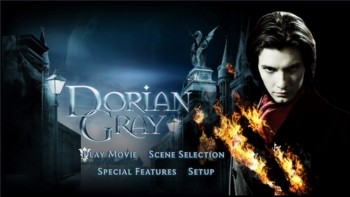 | 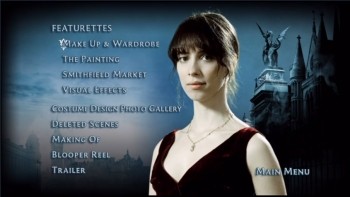 |
Video and Audio:
Dorian Gray arrives from E1 Entertainment in a 1.85:1 widescreen-enhanced presentation that preserves the fluctuating levels of brown, gray, and blue shades within the dark Victorian-style setting to exquisite degrees. Many sequences take place in dimly-lit locations where booze flows free amid a comely warmth, which are preserved here in a way that showcases fine contrast usage and a respectable level of depth within this standard-definition image. Several instances of detail, especially against the painting of Dorian, the scales in a yellow python, and in the lush costume design, offer quite a few fine moments of respectable crispness in the image. Exterior shots during the day are intentionally handled with a hollow blue-leaning coloring that never exudes much in warmth, and E1's transfer carries the splashes of colors -- greens from trees in a backdrop, cold skin tones, and the soppy rain -- in a healthy fashion. Dorian Gray looks exquisite here.
The aural design in Dorian Gray isn't as definable as the visual presentation, mostly gravitating around the back-and-forth conversations between Dorian and his collection of confidants, but this Dolby Digital 5.1 track offers plenty of mood to the proceedings. Musical cues scale along the mid-to-low range of the bass channel, as do both Colin Firth and Ben Chaplin's svelte vocal deliveries. A few of the sound effects fall a bit flat, like the crashing of a trunk in water, but other ambient elements like flickering fire and rainfall grace the audio treatment nicely. Everything, however, carries through without distortion and finely balanced for a pleasingly atmospheric sound experience. Only English subtitles are available with this release to match the sole English 5.1 track.
Special Features:
 Commentary with Oliver Parker and Toby Finlay:
Commentary with Oliver Parker and Toby Finlay: As soon as the writer / director duo begin to discuss "stripping out" the assorted ideas from the book in order to focus on something dramatically resonant, things begin to make sense. Oliver Parker explains how it's difficult to capture the story on-screen, how Firth's performance is "mesmeric" in his control (which it certainly can be), how older women walked out of the test screening at the more homoerotic moments in the film, as well as answering some questions about the artistic choices that they concocted for this adaptation. Discussion also focuses on critical reception to the film early in the track, and how the Oscar Wilde Society adored this version of the tale. Their tone drags later on in the audio track as Parker and Finlay lose steam, but the content still remains mildly intriguing as they discuss the film's cyclical nature and some of the striking locational shots.
Featurettes (4x3 SD):
Four short pieces are available that contain raw footage and a few on-the-fly comments, most lasting no longer than three (3) minutes in length. They involves Make-Up and Wardrobe (2:17), The Painting (1:27), and Smithfield Market (2:08). The one exception, Visual Effects (4:14), goes a bit more in-depth with the 3D modeling and subtle effects at-play in the picture, from the shifting visage of the painting to scenery shots implanted in actual footage.
Making of Dorian Gray (19:04, 4x3 SD):
Straight-on interviews with the cast and crew mix with behind-the-scenes shots and snippets from the film in this assembly piece, more concentrating on the cast's feeling about Finlay's interpretation of the source material and their method in latching onto the story's central essence. Writer Finlay expounds on his writing a bit, Rebecca Hall attempts to find the words to describe how the film's both faithful and spruced up for a modern age, and Colin Firth minces words about aesthetic beauty and morality in the work.
Also available are a series of trimming-the-fat Deleted Scenes (5:59, 4x3 SD), a Costume Design Photo Gallery, a Blooper Reel (9:24, 4x3 SD), and a Theatrical Trailer (1:29, 4x3 SD).
Final Thoughts:
Though the gothic genre trappings are full-force in Dorian Gray -- handsomely dim cinematography capturing ornate architecture, a vein of other-worldly suspense, and a hard-edged concentration on narcissism's consuming nature -- Oliver Parker's persistent attempts to convey hedonism's draw through lurid imagery collide with a lack of coherent grasp on the story's core points. What results is an attractive but muddy supernatural mystery that, oddly, mirrors the exact issues that Dorian as a character suffers from: gripping aesthetic beauty and a dark allure, but a contorted inner being. E1 Entertainment's presentation satisfies on a digital and supplemental level, even if the film itself lacks in this reviewer's eyes. Rent It.
|
| Popular Reviews |
| Sponsored Links |
|
|
| Sponsored Links |
|
|
| Release List | Reviews | Shop | Newsletter | Forum | DVD Giveaways | Blu-Ray | Advertise |
|
Copyright 2024 DVDTalk.com All Rights Reserved. Legal Info, Privacy Policy, Terms of Use,
Manage Preferences,
Your Privacy Choices | |||||||









